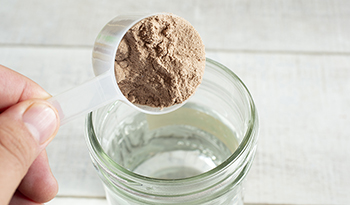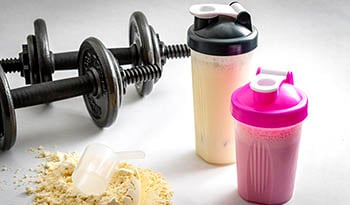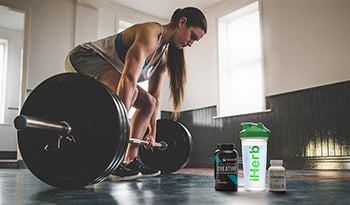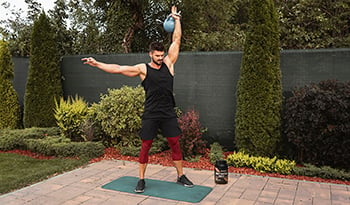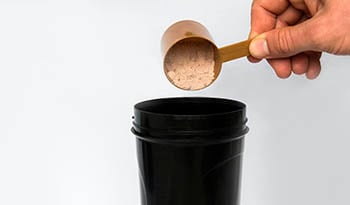Skal jeg drikke en proteinshake efter cardio?

Hvis du nogensinde har afsluttet et hårdt løb, HIIT-session (højintensitetsintervalltræning) eller spin-klasse og spekuleret på, „Skal jeg drikke en proteinshake efter dette? „- du er ikke alene. Mens protein efter træning ofte er forbundet med vægtløftning og muskelopbygning, kan cardio-entusiaster også drage fordel af strategisk tidsbestemt (og tilstrækkeligt) proteinindtag.
Uanset om du træner for udholdenhed, fedttab eller generel kondition, kan forståelsen af proteinets rolle efter cardio hjælpe dig med at komme hurtigere, forbedre ydeevnen og nå dine mål mere effektivt.
Det enkle svar er ja, protein shakes er en god mulighed for cardio! De er enkle, nemme og bekvemme. Prioriteten er at få nok protein, som du kan opnå gennem en proteinshake eller ved at spise hele fødevarer.
Denne artikel beskriver fordelene ved protein efter træning til restitution og muskelvækst, hvornår du skal indtage det, og hvor meget din krop har brug for. Fortsæt med at læse for at lære, hvordan du får brændstof til bedre ydeevne og optimerer dit daglige helbred.
Hvad er protein, og hvorfor har jeg brug for det til bevægelse og velvære?
Protein er et af de tre essentielle makronæringsstoffer sammen med kulhydrater og fedtstoffer. Protein består af aminosyrer, der bygger stoffer i din krop. Hver gang du træner, især inden for træningssport (læs: cardio) som løb, cykling eller svømning, påfører din krop stress, hvilket er en normal og nødvendig del af træningen. For at genopbygge stærkere og komme hurtigere kræver din krop protein.
Proteins rolle i genopretning
Protein efter cardio understøtter muskelreparation, tilpasning og bedring. Efter træning begynder kroppen at nedbryde muskelprotein til energi. Uden nok protein kan du opleve længere restitutionstider og endda muskeltab, især i perioder med højt træningsvolumen eller kalorieunderskud.
Selvom denne proces ofte fremhæves efter modstandstræning, kan cardio (især moderat til høj intensitet eller langvarig) stadig resultere i muskelnedbrydning. For udholdenhedsatorer eller andre, der laver regelmæssig cardio, er protein afgørende for at reparere muskelfibre, reducere ømhed og fremme generel restitution.
Ud over atletisk præstation spiller protein en kritisk rolle i immunfunktion, hormonregulering, energi og vævssundhed. Det hjælper med at holde dig sund, understøtter mager kropsmasse og stabiliserer endda blodsukkeret - nøglefaktorer for enhver atlet, der prøver at præstere konsekvent og føle sig bedst, uanset om de laver masser af cardio eller ej.
Uanset om du logger miles, jager et løb eller går lange gåture, er det vigtigt at få nok proteiner af høj kvalitet til at forblive stærk, komme godt ud og nyde dit bedste.
Fordele ved at drikke en proteinshake efter cardio
At nyde en proteinshake efter en konditionstræning giver mange fordele, herunder:
- Muskelbevarelse og reparation: Protein hjælper med at opretholde muskelmasse, selv under vægttab eller hjertefibre med højt volumen. Dette er afgørende for udholdenhedsatleter, rekreative løbere og alle, der ønsker at forblive magre og stærke.
- Reduceret muskelømhed: Protein efter træning kan hjælpe med at reducere forsinket muskelømhed (DOMS), især når det kombineres med kulhydrater. Nuværende forskning tyder dog på, at protein efter træning muligvis ikke har nogen indflydelse på muskelømhed, især hvis du allerede spiser nok af det i løbet af din dag.1
- Forbedret restitution: En hurtigere restitution betyder, at du kan træne mere konsekvent, hvilket er afgørende for både holdbarhedsgevinster og den samlede præstation. Protein post-cardio hjælper med at reparere væv og genopbygge aminosyrer.2
- Forbedret kropssammensætning: Opretholdelse eller forøgelse af muskelmasse, samtidig med at fedtmassen reduceres, er fitnessens hellige grin. Brug af en proteinshake efter cardio hjælper med at understøtte denne balance, især når den er parret med styrketræning.
- Vægtstyring: Hvis du laver cardio for vægttab eller fedttab, kan en proteinshake efter træning hjælpe med at håndtere sult, reducere snacks og stabilisere blodsukkeret, som er nøglefaktorer i styringen af kalorieindtaget i løbet af dagen. 3
Hvor meget protein har du brug for efter cardio?
For de fleste mennesker er 20 til 30 gram protein af høj kvalitet efter træning et solidt mål.2 Den ideelle mængde afhænger af:
- Intensitet og varighed af cardio
- Individuelt samlet dagligt proteinindtag
- Træningsmål
- Mål for kropssammensætning
Timing - Hvor hurtigt skal jeg have min shake efter cardio?
Myten om „anabolsk vindue“ antydede tidligere, at protein skal indtages inden for 30 minutter efter træning. Selvom vi nu ved, at vinduet er meget bredere (op til flere timer), kan en shake kort efter din session, især hvis du ikke har spist i de sidste par timer, forbedre restitutionen og bidrage til dit samlede proteinindtag for dagen.
Protein shakes giver bekvemmelighed. Af denne grund udgør de en god „vanestak“ efter træning. Medbring et proteinpulver i en shakerflaske, eller hav en praktisk proteinkilde klar til at tage med derhjemme for nem tankning efter din træning.
Skal du inkludere kulhydrater efter cardio?
Hvis din cardio er lav intensitet, er kulhydrater muligvis ikke nødvendige efter træning. Men for cardio med moderat til høj intensitet eller lang varighed kan tilføjelse af kulhydrater til din shake hjælpe med at genopbygge glykogenlagre, forbedre muskelproteinsyntesen og fremskynde genoprettelsen. 4
En simpel shake med valleprotein og en banan eller blandet havre er et godt eksempel. Hvis fedttab er dit mål, skal du holde kulhydraterne kontrolleret, men frygt dem ikke! Både tilstrækkeligt protein- og kulhydratindhold er afgørende for kvalitetssikring og velvære.
Sådan vælger du den rigtige type protein
Så du har bestemt, hvor meget protein du har brug for efter træning, og hvornår du skal indtage det, men hvordan ved du, hvilken type protein der er mest effektiv? Her er hvad du skal kigge efter i en god post-cardio-shake:
- Ingredienser af høj kvalitet: Se efter valle og plantebaserede proteiner — som ærte- eller risprotein — fra kilder af høj kvalitet.
- Minimale ingredienser: Vælg en shake med lavt sukkerindhold, ingen fyldstoffer og rene ingredienser.
- Bekvemmelighed: Shakes er ideel efter cardio, når du ikke har brug for et fuldt måltid. De er nemme at tage med til gymnastiksalen eller nippe til, mens du er på farten. Ud over shakes kan du prøve at inkorporere proteinpulver i bagværk, havre, popsicles og budding med disse lækre proteinrige opskrifter.
For andre kilder til post-cardio-protein skal du overveje hele, proteinrige fødevarer eller alternative kosttilskud som:
Almindelige fejl, der skal undgås
Undgå disse almindelige fejl ved at tænke efter en anstrengende konditionstræning:
- Spring protein helt over: Mange mennesker prioriterer hydrering og kulhydrater efter cardio, men glemmer vigtigheden af protein, hvilket kan føre til langsommere bedring.
- Brug af proteinshakes som måltidserklæring: En shake er et supplement, ikke en erstatning. Mens en shake kan hjælpe dig med at opfylde dine post-cardio-proteinbehov, skal du sørge for at spise et ordentligt måltid inden for få timer efter din cardio- eller træningssession.
Så skal du drikke en proteinshake efter cardio?
Hvis du er seriøs omkring ydeevne, restitution eller kropssammensætning, ja, bør du overveje kraftigt at have en proteinshake efter en konditionstræning. En proteinshake efter cardio kan hjælpe med at beskytte og opbygge magre muskler, understøtte hurtigere restitution og forbedre energien til din næste træning.
Du behøver ikke at være besat af timingen eller drikke en shake efter hver let joggetur. Men for moderat til intens cardio, især i en fast eller højfrekvent træningstilstand, er tilføjelsen af en post-cardio-shake et af de enkleste og mest effektive genoprettelsesværktøjer, der er tilgængelige.
Fitness handler om at opbygge smarte vaner. En godt tidsbestemt proteinshake kan være den restitutionsboost, du ikke vidste, du havde brug for.
Referencer:
- Ten Haaf DSM, Flipsen MA, Horstman AMH, et al. Effekt af proteintilskud versus kulhydrattilskud på muskeltrækkere og træthed efter en 15 km landevejsløb: et dobbeltblindt randomiseret kontrolleret forsøg. Ernæring. 2021; 13 (3): 1-16.
- Jäger R, Kerksick CM, Campbell BI, et al. International Society of Sports Nutrition Position Stand: Protein og bevægelse. J Int Soc Sports Nutr. 2017; 14 (1).
- Monteyne A, Martin A, Jackson L, et al. Valleproteinbrug efter modstandstræning reducerer energiindtaget ved et måltid efter træning. Eur J Nutr. 2018; 57 (2): 585-592.
- Kirksick CM, Arent S, Schoenfeld BJ, et al. Positionsstatus for International Society of Sports Nutrition: timing af næringsstoffer. J Int Soc Sports Nutr. 2017; 14 (1) :33.
ANSVARSFRASKRIVELSE: Wellness Hub har ikke til hensigt at stille diagnoser...

















































































 Indholdsfortegnelse
Indholdsfortegnelse





